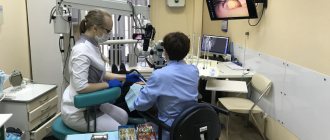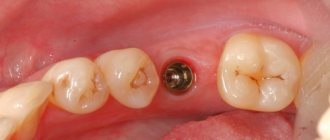Once upon a time, the great ancient Greek philosopher Socrates said: “All professions are from people, and only three are from God - teacher, judge and doctor (doctor).” In other words, to become a judge, teacher or doctor you need not only to receive a special education and acquire certain skills, but also to have a gift from above. Let us note that the profession of a doctor stands apart in this list, since a professional mistake of a judge or teacher can still be corrected, but a mistake of a doctor is fraught with irreversible consequences.
Once upon a time, the great ancient Greek philosopher Socrates said: “All professions are from people, and only three are from God - teacher, judge and doctor (doctor).” In other words, to become a judge, teacher or doctor you need not only to receive a special education and acquire certain skills, but also to have a gift from above. Let us note that the profession of a doctor stands apart in this list, since a professional mistake of a judge or teacher can still be corrected, but a mistake of a doctor is fraught with irreversible consequences.
At the same time, the profession of a doctor is perhaps the only specialty that involves a continuous learning process, including throughout the doctor’s entire professional career. And if you consider that the work of a doctor is one of the most difficult, both in terms of emotional stress and in terms of physical activity, then it becomes clear that not everyone can become a doctor. What personal qualities do you need to have to become a doctor, and what is needed for this? In this article, we will try to give comprehensive answers to these questions, which will make it much easier for you to decide on your future profession.
What is the difference between the words doctor and physician, and when to use them correctly?
Unfortunately, for most residents the meaning of these words is absolutely equivalent. In some situations, the concepts can indeed be equated to each other, but in others such a replacement can confuse the audience.
Let's take a closer look at the meaning of both concepts and the cases of their use.
Who is supposed to be called a “doctor”?
First of all, only citizens who have received a higher medical education . Mainly, the doctor is engaged in practical activities. Its primary task is to maintain the human body in a state of full functioning.
At the same time, a physician must necessarily undergo a training course at a university, because without this it will simply not be possible to detect and prevent pathology in a timely manner. If the position of a doctor is performed by a person without the appropriate level of education, criminal liability will be imposed, because we are talking about the health and life of a person.
The word "doctor" has roots in Old Slavic . It comes from the verbs “to speak”, “to lie”. In Serbia and Croatia it is translated as “sorcerer”, “witch doctor”, and in Bulgaria as “sorcerer”. This is probably due to the fact that healing is one of the most ancient activities.
It has been repeatedly intertwined with philosophy, alchemy and theology, so many are of the opinion that medical treatment has a largely psychological effect.
The social position of a doctor in our century is contradictory. Firstly, it is believed that doctors should be shown respect , since this profession is directly related to the moral values of the individual (depending on the person’s ability to sacrifice).
Sometimes it is the empathy and timely support of a physician that plays a key role in the client’s recovery, because the doctor enjoys authority. Secondly, excessive effort is combined with low wages, compared to other specialists who have completed the same period of training.
Often doctors do not have enough funds to subscribe to medical journals or take advanced training courses.
Who is the doctor?
A researcher can receive the title of doctor after defending a doctoral dissertation. Only a candidate of science can obtain this degree . The dissertation is an independent research work of the employee. It is written both for obtaining the title of Candidate of Sciences and for obtaining the title of Doctor.
A higher degree gives a researcher the opportunity to independently organize and conduct research experiments, and a scientist gives the opportunity to teach. In addition, both theorists receive a salary increase and the prospect of receiving funds for the purchase of housing.
The dissertation can be presented in three ways:
- handwritten (now in electronic form);
- in the form of a monograph (a small book with evidence of the relevance of the topic and relevant reviews);
- as a scientific report (in accordance with established requirements).
The official defense of the dissertation work is carried out before the assembled council. It must necessarily include doctors of science in the specialty to which the defense concerns, and scientific organizations are also involved.
All researchers can take part in reviewing the defense of work for an academic degree. After a committee member writes his review, a secret vote is held. at least 2/3 of those present vote for granting this employee a higher academic degree , a request to confirm the decision is sent to the Higher Attestation Commission.
Its employees make the final decision.
According to the Resolution on the procedure for awarding degrees , the dissertation material must be submitted for consideration to representatives of the dissertation council 3 months before organizing the defense. The submitted abstract will be accompanied by an abstract.
This is a 2-2.5 page work that displays the main provisions of the dissertation. The work itself should include:
- data confirming the need for the research performed;
- a theoretical basis that reflects the work that became the prerequisite for the research;
- practical activities of the candidate to obtain the necessary data;
- prospects for the development of the problem being studied.
Drawing conclusions
Based on the above, we see that the doctor is an employee of a medical institution. He is engaged in practical activities. To become a physician, it is enough to obtain a higher medical education, but you do not need to be a doctor of science for this.
Doctor is the title of the highest academic degree. This employee can devote himself to medicine and engage in treatment, but the main type of his work is theoretical and research activities.
History of the profession
Even in primitive times, there were individual people who were called “witch doctor”, “shaman” or “healer”. It was to them that all sick people were brought, and they, in turn, tried to treat them. Ancient people knew how to make bandages, apply splints, set joints, and perform craniotomy. They tried to give people various decoctions and tinctures to drink, with the hope of healing. Sometimes witchcraft was used: shamans turned to spirits and gods, read prayers and spells, and performed special rituals.
The most famous doctor in history was Hippocrates, who lived in Ancient Greece. It was he who began to systematically develop medicine as a separate science. Hippocrates managed to combine individual disparate knowledge into a coherent system and set of rules for the treatment of certain diseases. It was he who formulated the causes of many diseases, proving that the human body is influenced by environmental factors.
The ethical oath that all medical students take before graduating is named after Hippocrates. It formulates the code and moral principles of a doctor who treats people.
Difference between doctor and doctor
Human life is quite often associated with a wide variety of branches of science and specialties, however, there are areas that we need more often than others. An example of such a field is medicine. In fact, a person is surrounded by a wide variety of medical aspects .
In particular, each of us, or almost everyone, is born in an appropriate medical institution. In active life, he is observed in the local department of the same clinic and undergoes a medical examination. He also brings his children there. Considering how common it is to refer to doctors as doctors in everyday life, it is not surprising that many wonder whether these synonyms are similar and whether they are freely interchangeable.
In order to fully appreciate all the features and traits of these concepts, to eliminate errors and incorrect use, it is better to understand everything in more detail.
So, the doctor is a practicing specialist who has received the required medical education. In addition, doctors have certain qualifications in a specific field of activity and may have a narrow focus in medical science.
If we talk about such a concept as a doctor, then this is actually a degree that follows a candidate of sciences. This is a scientific gradation that is assigned directly to a person, and not at all to the object of research. It is worth noting that doctors of science, even those who have devoted their research to medicine, may not necessarily be doctors.
On the other hand, not many doctors actually have a doctorate or candidate's degree, since in general practice, in-depth scientific research often takes up too much of the practitioner's time. At the same time, doctors of sciences, deeply focused directly on the study of characteristic scientific or even medical aspects, simply do not have time for direct practice and assistance, as doctors do.
After such clear definitions, a reasonable question arises as to why, in principle, a strange confusion between doctor and doctor arose in society. Why are they so often used as synonyms? Of course, this is connected with history. In Western Europe, from quite old times, there was a peculiarity that only those who received an academic degree at a university could be practicing doctors.
That is why the doctor had to write and defend a dissertation and become a doctor. It is worth noting that in those days, calling a doctor “doctor” was a good sign, since this significantly increases the level of the specialist, comparing him to a real professional in the field of medicine.
However, in practice today everything is completely different. Ordinary communication ethics does not accept such a term in relation to doctors. Addressing a doctor as a doctor is already considered unacceptable or extremely unethical. It's like calling a simple military man a general.
In general, there is currently no requirement for a doctor to obtain a doctorate. The amount of data that is transferred to specialists at universities is orders of magnitude greater than the knowledge that doctors of old had. A modern doctor will give odds to any specialist with an academic degree of past centuries. That is why it is quite understandable that a person with such high training is allowed to treat people.
It is worth noting that “doctor” itself is an English title. The original Russian words are “doctor” and “doctor”. Doctor is short for “doctor,” that is, the same doctor. Traditionally, a doctor is called upon to devote all his knowledge, attention and abilities to a detailed study of the general physiology of a person, prevention and relief from a wide variety of diseases.
At the same time, a doctor exclusively means the presence of a characteristic certificate, which he received after completing his internship. There are also veterinarians who have relevant diplomas from a higher educational institution in the veterinary section.
It is these specialists who treat animal diseases, maintain sanitary breeding standards, and monitor and prevent contagious diseases to maintain the health and integrity of the livestock population.
Let us also mention that in Russia and certain CIS countries there is also such an academic degree as a doctor. To obtain the title, a specialist must write an appropriate dissertation , which must fully comply with certain regulations and rules.
The presence of original research, strong theoretical training and informed assumptions in the framework of solving a specific scientific problem form the basis of any relevant scientific work, which qualifies for the award of a doctoral degree.
Comparison
However, in modern everyday life the words “doctor” and “physician” are often used as synonyms. Why does this happen? Western Europe has practiced this approach since ancient times - only those who received a doctorate degree at a university could be a practicing doctor. To be a doctor, a doctor must complete a dissertation. Today, many people believe that the title “doctor” is a laudatory title for a specialist, exalting his dignity. However, etiquette considers such a move unacceptable and unethical, as if you called any military man a general.
Doctor and healer are original Russian meanings that denoted a specialist who has the right to treat people or animals. Doctor (Doctor) is an English meaning that also means passing certification after completing an internship. A doctor (from the word lie, speak, conspire) is a person who devotes all his knowledge to the study of human physiology, the prevention of various diseases and their treatment. A veterinarian is a person who has a diploma from a higher educational institution in the specialty of veterinary medicine. He treats diseases in animals.
Doctor of Science (doctoral degree) for Russia and some CIS countries is an academic degree of the highest level. In order to receive an academic degree, a specialist must write a dissertation that must comply with certain provisions. In particular, it should contain original research and theoretical assumptions on the basis of which any scientific problem of particular importance for the country can be resolved.
Source
What is the difference between a doctor and a doctor?
We are born in a medical facility, observed in a clinic, undergo medical examinations, and take our children to consultations. That is why the question often arises: what is the difference between the terms doctor and doctor.
A profession that is assigned to students who have completed a course of study, practice in medicine and received a diploma confirming knowledge, qualifications, and the right to work in medicine or surgery.
- Responsible for providing medical care to patients following a thorough diagnosis based on patient interviews and laboratory testing.
- They give prescriptions and advice to the patient on how to receive treatment and maintain health.
- Determine the urgency of subsequent examinations and appointments, prescribe medications, treatment methods, issue sick leave certificates, consistently maintain outpatient records of patients, and reports.
- They carry out prevention and plan treatment of the disease based on the diagnosis and observed symptoms.
- They refer the patient to other specialists and give directions for a more accurate ultrasound examination.
- Refers for a medical and social examination regarding disability.
Job responsibilities
Most doctors have approximately the same range of responsibilities. These include:
- Examination and questioning of the patient about his state of health and his medical history,
- Prescribing the necessary tests and diagnostic procedures,
- Making a diagnosis and communicating it to the patient.
- Drawing up a treatment plan, including taking medications, performing medical procedures and, if necessary, performing surgical operations.
- Managing the patient during his treatment process.
- Maintaining patient records and other necessary medical documents.
The exception is pathologists working in laboratories and morgues. Their work has a different specificity. Their main task is to make a lifetime diagnosis based on the results of a biopsy, or to establish the cause of death of the patient.
The exception is pathologists working in laboratories and morgues. Their work has a different specificity. Their main task is to make a lifetime diagnosis based on the results of a biopsy, or to establish the cause of death of the patient.
Doctor
The highest degree is awarded to a person on the basis of defending a dissertation , the next level being the Candidate of Sciences. You can defend a dissertation on any subject. PhD candidates conduct scientific research in various fields.
Doctoral degree awarded:
- Legal.
- Economic.
- Pedagogical.
- Technical.
- Psychological.
- Medical.
- Physical and mathematical sciences.
You can be a doctor in various fields. For example: a person who has a doctorate in history is a Doctor of Historical Sciences.
Medical Universities of Russia
The following universities are considered the most authoritative and in demand among Russian applicants:
- First Moscow State Medical University named after. THEM. Sechenov (MSMU).
- Russian National Research Medical University named after. N.I. Pirogov (RNIMU).
- Moscow State Medical and Dental University named after. A.I. Evdokimov.
- First St. Petersburg State Medical University named after. Academician I.P. Pavlova (PSPbSMU).
- St. Petersburg State Pediatric Medical University.
- Ural State Medical University (USMU).
- Kazan State Medical University. (KSMU).
Similarities
A doctor has a diploma confirming what activities he is allowed to engage in: treating people or animals, injuries or diseases. Doctors are called orthopedists, dentists, clinical psychologists, chiropractors, and physiotherapists. In the CIS countries, a doctor or other specialist who has graduated from a university and defended his PhD thesis receives a doctorate. In America, the word means passing certification after completing an internship. Doctor is a title awarded to persons who have achieved the highest degree in the field of medicine, law, art, dentistry, and veterinary medicine. Translated from Latin, the word means to teach, teach, explain. A citizen’s academic degree is confirmed by a corresponding document – a diploma.
It is believed that in medical practice these terms are synonyms . You can say: I’ll go to the doctor, I’ll go to the doctor. The meaning doesn't change. There is no difference in such combinations, unless we consider doctors of science.
How to build a career
Promotion in a government agency can be vertical or horizontal. In the first case, the doctor occupies an administrative position, and in the second, he receives a higher qualification.
A career can also be built in science if you have an interest and ability for research. Knowledge, talent and experience will help a simple university teacher or practicing doctor become not only the head of a department or dean of a faculty, but also a medical luminary of international level.
Differences
A doctor is a person who has graduated from a higher medical institution. A medical doctor does not have a doctorate (without a dissertation), but has a state diploma after completing an internship. The defense of the thesis is prepared a year before passing the state exams.
In Europe, this is the name given to people with completed higher education in the field of medicine, dentistry, pharmacy, and veterinary medicine. In films or TV series, actors often call each other doctor. This is due to the fact that in other countries the word has a different meaning. Patients, when coming to the clinic, often call the doctor “doctor”, showing respect. Although this is not correct. By calling a healthcare worker this way, we are somewhat exaggerating his importance.
Students study in medical universities. After graduation, students who wish to study further enter graduate school. A graduate student is a young researcher (regardless of the discipline) who writes a scientific dissertation to obtain a title in his specialty, under the guidance of a supervisor. Research often lasts many years. After defending a doctoral dissertation, the researcher receives the title. It takes many years to obtain a doctorate. There are many more doctors in medicine than professors. Only a minority of them hold the prestigious title of professor.
Doctor is a general term for all candidates of science who defended a dissertation in their specialty and received an honorary title. This is the highest title awarded on the basis of a public defense of a doctoral dissertation.
The candidate of sciences is awarded a diploma. This is the first step in obtaining a Doctor of Science. In order to become a candidate of sciences you need:
- Have a university specialist diploma.
- Pass the candidate minimum.
- Have research work supervised by the certification commission.
- Prove the value of your ideas.
- Successfully defend your dissertation.
There are two options for obtaining an academic degree:
- Postgraduate studies (3 years full-time and 5 years part-time).
- Application is a free form under the guidance of a scientific supervisor.
Doctor vs Doctor
"If symptoms continue, consult your doctor."
This is one of the statements that healthcare enthusiasts commonly hear. The reminder can be found in almost all commercials for medicines and vitamins. When patients experience a recurrence of symptoms, they dial their doctor to schedule an appointment for consultation.
So, which one should you visit: a doctor or a doctor? Perhaps a better question is whether there really is a difference between a doctor and a physician.
Various medical books and publications imply that doctors are responsible for providing care to patients after a thorough diagnosis, which should be based on patient interviews and physical examination. They can also provide tidbits of knowledge about how their patients can stay healthy and prevent disease.
Doctors also have the right to determine the urgency of follow-up examinations and appointments, as well as prescribe medications and treatments. Simply put, it is the doctor who advises patients when they feel that something is wrong with their bodies. Doctors plan treatment for the disease based on observed symptoms and diagnosis. They may also refer patients to specialists.
Based on the list of duties and responsibilities of a physician, it is natural to assume that the terms “doctor” and “doctor” are synonymous. It is true that the two terms can be used interchangeably in many cases. Please note, however, that all doctors are doctors, but not all doctors are doctors.
To become a doctor, a prospective medical school student must obtain a 3.8 GPA, which gets them into college for a four-year bachelor's degree; this can be considered as their preliminary education. By taking the MCATS and receiving a high score, a student can complete four more years of medical school. Upon completion, they automatically become a doctor of medicine (MD) or physician.
However, by continuing his studies for a two- to five-year specialization or residency, he can enter specific areas of medicine, remaining a doctor, but no longer just a doctor. They can choose to specialize in surgery, oncology or dermatology. They are called doctors, but not doctors. Here's where the difference comes in: Doctors have completed eight years of medical school, but doctors with a specialty have completed 11-13 years of training.
Doctors may be a physician, dermatologist, oncologist, dentist, podiatrist, pediatrician, etc.; There are various subcategories of doctor.
Their work requirements may also differ; Doctors require a medical degree from medical schools that are accredited and recognized by the state. They may also be required to present actual DEA and DPS registration certificates and proof of completion of a two-month internship. Doctors also have the same requirements; however, additional internship experience is required when they prefer to work in their specialty. Further examinations and certifications also serve as a prerequisite depending on the state in which they reside.
Finally, physicians and clinicians may differ in the way they treat patients. Doctors use drugs and medications to make their patients healthy. On the other hand, doctors can perform surgeries and more complex medical procedures. Given this information, anyone can conclude that the term "physician" is used to refer to those who have completed doctoral studies in medical schools, regardless of their specialization. "Physician", on the other hand, refers only to those who have completed their doctorate in the practice of medicine.
Case studies 78
— Immediately after college, I went north to earn some money and gain experience at the same time. My mother’s cousin invited me there and said that they were always short of doctors. I stayed there for three years until I encountered one rather serious case - three men flew into the medical unit carrying a wounded fourth man in their arms. Drunk as hell, with a piece of pipe sticking out in his shoulder, and even with frostbite, they dragged him for about two kilometers.
— Did you manage it? – I asked, noticing that the client was stuck in memories.
“Unfortunately, such cases are not uncommon in medical practice.
- Why here?
- What about your personal life?
- And yet something bothers you?
- You see, I should be happy - a good place, a beautiful wife, an apartment, a car. There is an opportunity to go on vacation somewhere, I can see my father and stepbrother again. But I can’t enjoy it, as if it wasn’t me who earned it all, but someone else—a complete stranger.
- How did she take it?
— It’s calm, which is surprising. She simply shook her head and said that I was a good person who had been hit hard by fate. This may seem stupid and overly pretentious to you, but then I realized that by exchanging the doctor’s oath for a quiet life, I had lost something very important, something that made me myself.
Source











